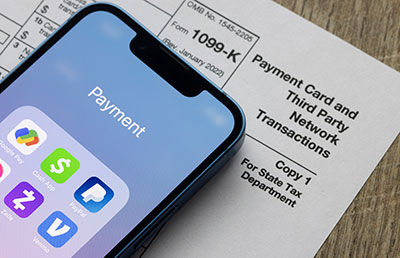What Should and Shouldn't Be Included on the 2023 Form 1099-K
By CCH AnswerConnect Editorial –
August 28, 2023

Beginning in 2023, third-party payment networks must file Form 1099-K with the IRS and provide a copy to the taxpayer when the gross payment amount is more than $600. However, not all payments from third parties are taxable. Taxpayers can take steps to prevent non-taxable items from being reported. They also can remedy a third party payment reported in error.
What Should Be Reported on Form 1099-K
Payment card companies, payment apps, and online marketplaces are required to file Form 1099-K with the IRS. And they must send a copy of the form to taxpayers by January 31. Taxpayers should expect a Form 1099-K if they received (1) payments with payment cards, including credit cards, debit cards, and stored value cards (gift cards); and (2) payment of over $600 with a payment app or online marketplace. This includes payments for a personal item or goods sold, services provided or property rented through a:
- peer-to-peer payment platform or digital wallet;
- online marketplace (sale or resale of clothing, furniture and other items);
- craft or maker marketplace;
- auction site;
- car sharing or ride-hailing platform;
- real estate marketplace;
- ticket exchange or resale site;
- crowdfunding platform; or
- freelance marketplace.
What Should Not Be Reported on Form 1099-K
Gifts or reimbursement of personal expenses from friends and family should not be reported on Form 1099-K. They are not payments for goods or services.
Thus, for example, if the taxpayer shares the cost of a car ride or a restaurant meal, is repaid by a roommate for a household bill, or receives money for birthday or holiday gifts, the payments aren't taxable income, and therefore should not be reported on Form 1099-K.
How to Prevent Non-taxable Items From Being Reported on Form 1099-K
The IRS advises taxpayers using payment apps for the above non-taxable items to note these types of payments as non-business in the payment apps when possible.
What To Do if the Taxpayer Receives a Form 1099-K in Error or an Incorrect Form 1099-K
A taxpayer may receive a Form 1099-K in error if the form reports payments that were gifts or reimbursements from family or friends, doesn't belong to the taxpayer, or is a duplicate.
If the taxpayer received a Form 1099-K in error or an incorrect form, the taxpayer should contact the issuer immediately. To locate the issuer, the taxpayer should see "FILER" in the top left corner of the Form 1099-K.
The taxpayer should keep a copy of the original form and all correspondence with the issuer.
If the taxpayer can't obtain a correct Form 1099-K, the taxpayer should report the amount on Schedule 1 (Form 1040), Additional Income and Adjustments to Income as follows: (1) enter the incorrect amount on Part I, Line 8z, Other Income; and (2) enter the adjustment for the incorrect amount on Part II - Line 24z - Other adjustments.
Copyright © 2023 CCH Incorporated and its affiliates. All rights reserved. Reprinted with permission from Wolters Kluwer.
The information in this guide has been gathered from many sources, including the Internal Revenue Service, the Social Security Administration, state agencies, professional organizations and members of the NJCPA. The COVID-19 pandemic has prompted the majority of state agencies to offer more online and prerecorded services. Though offices have reopened after the COVID-19 shutdown, it’s best to check online or call before you visit.
Material contained within this guide should be augmented by, and used in accordance with, a certified public accountant's professional judgment. Your CPA can properly apply the tax laws and regulations to the facts and circumstances of your particular situation. For help with locating a CPA, visit findacpa.org.
The New Jersey Society of Certified Public Accountants is not responsible for any claims arising as a result of this information or its usage.
This guide was updated in October 2023. Future users of this material are cautioned that some portions, particularly tax-related information, may become outdated.